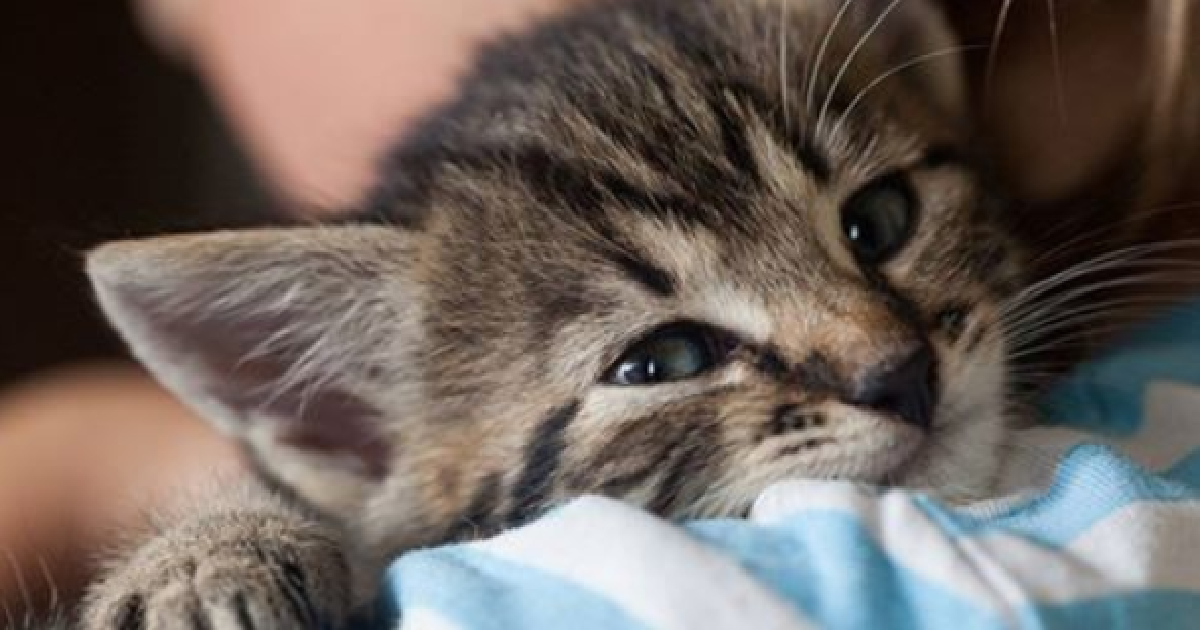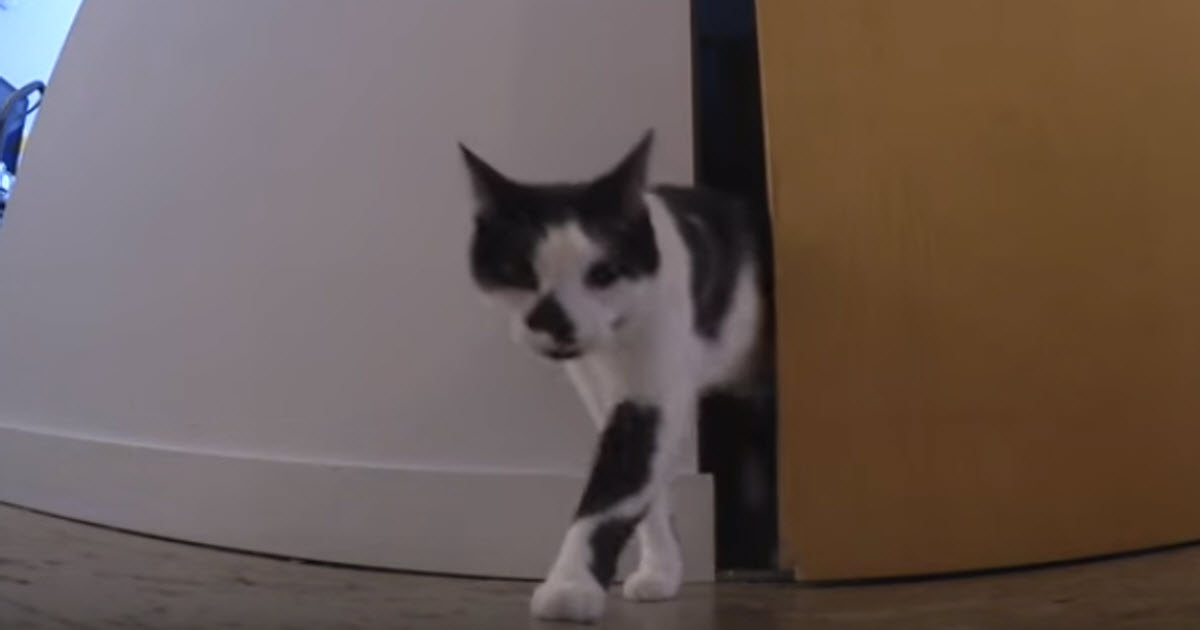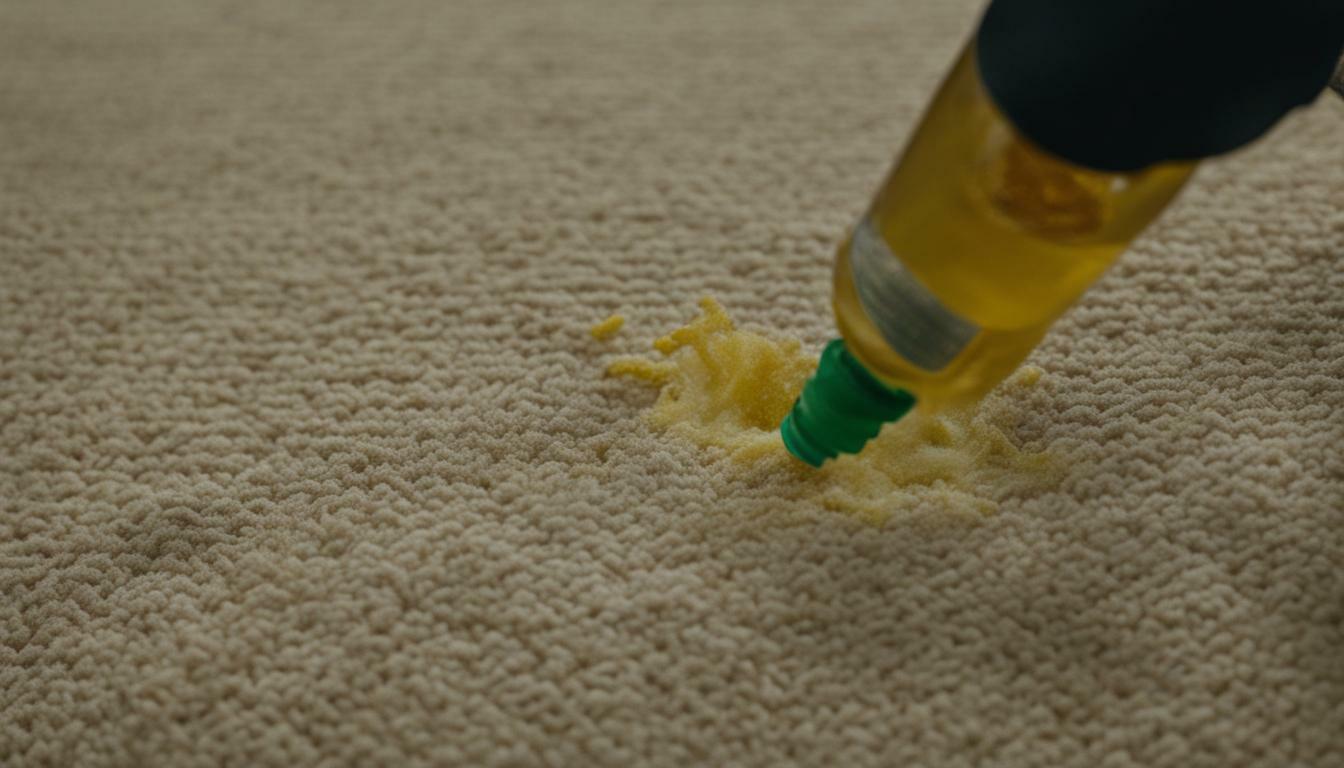
Are you struggling to get rid of that lingering cat pee smell in your home? Don’t worry, I’ve got you covered with these expert tips on how to eliminate cat urine odor effectively. Understanding the causes of inappropriate urination by cats is crucial in resolving the problem. Medical problems, behavior issues, and lack of access to a clean litter box can all be contributing factors. Timely clean-up is essential, as the longer cat pee sits, the stronger the ammonia-like smell becomes.
To start the cleaning process, make sure you soak up the urine with paper towel or cloth. Use cold water to clean the area, as heat can actually make the stain and odor more difficult to remove. Avoid ammonia-based cleaners, as they can attract cats to urinate in the same spot. Instead, opt for ammonia-free cleaners. Enzyme cleaners and solutions of baking soda and white vinegar are effective at neutralizing the smell of cat urine. Applying these solutions to the affected area and letting them sit before blotting and rinsing can work wonders.
To address underlying issues and prevent future accidents, it’s important to identify and resolve any medical problems or behavioral issues that may be causing the inappropriate urination. Additionally, taking preventive measures such as increasing the number of litter boxes, cleaning them more frequently, and addressing any lifestyle stresses on your cat can help discourage the behavior.
When it comes to removing cat pee smell from different surfaces, there are specific techniques to follow. For hard surfaces, blot up the urine, clean with a solution of dish soap and water, and sprinkle baking soda to neutralize any remaining odor. For furniture, a vinegar and water solution can be used to clean the affected area, or you can sprinkle baking soda and vacuum it up after it sits for a while. To remove cat pee smell from a mattress, soak the area with vinegar and let it sit before using an enzyme treatment spray. And for clothes, soak them in a vinegar and water solution or wash them separately with a laundry detergent containing enzymes.
Key Takeaways:
- Understanding the causes of cat pee smell is essential for effective elimination.
- Timely clean-up is crucial to prevent the ammonia-like smell from becoming stronger.
- Soak up the urine and clean with cold water to prevent odor setting in.
- Avoid ammonia-based cleaners as they can attract cats to urinate in the same spot.
- Enzyme cleaners and solutions of baking soda and white vinegar are effective in neutralizing the smell.
Understanding the Causes of Inappropriate Urination by Cats
Before we tackle the problem of cat pee smell, it’s important to understand why your furry friend may be urinating outside of the litter box. There are several potential causes for this behavior, including medical problems, behavior issues, and lack of access to a clean litter box.
Medical problems such as urinary tract infections, bladder stones, or kidney disease can cause cats to urinate in inappropriate places. If your cat is experiencing any discomfort or pain while urinating, it’s important to consult with a veterinarian to rule out any underlying medical issues.
Behavior issues can also contribute to cats peeing outside of the litter box. Stress, anxiety, or changes in the home environment can lead to this behavior. It’s important to provide a calm and safe environment for your cat and address any potential stressors in their life.
Additionally, lack of access to a clean litter box can cause cats to seek alternative places to relieve themselves. Cats are naturally clean animals and prefer a clean litter box. Make sure to scoop the litter box daily and provide enough litter boxes for all the cats in your household.
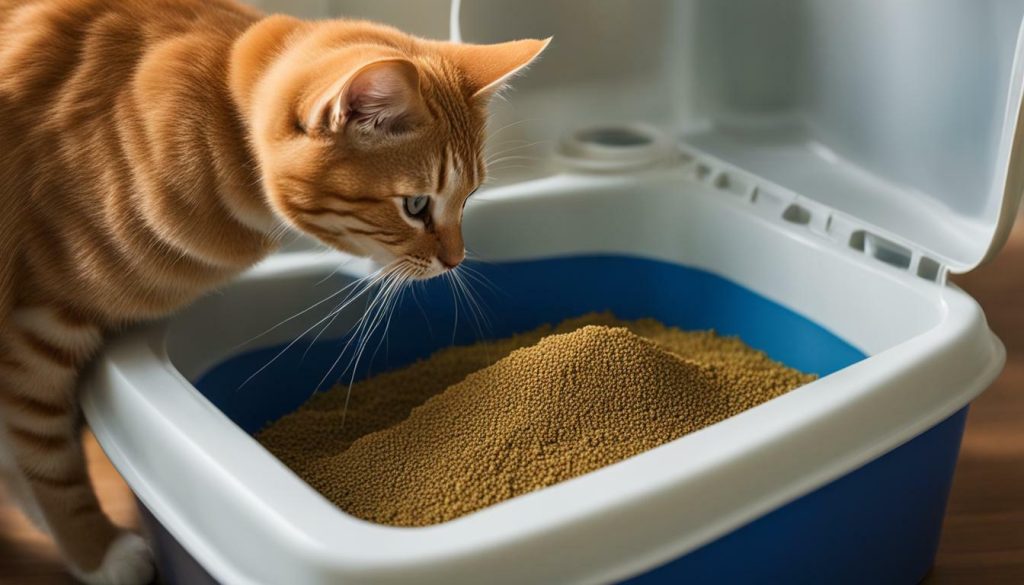
| Cause | Symptoms | Solution |
|---|---|---|
| Medical problems | Urinating outside of the litter box, frequent urination, blood in urine | Consult with a veterinarian to diagnose and treat any underlying medical issues |
| Behavior issues | Urinating outside of the litter box due to stress, anxiety, or changes in the home environment | Provide a calm and safe environment, address any potential stressors, and consider behavioral therapy |
| Lack of access to a clean litter box | Urinating outside of the litter box due to a dirty or inaccessible litter box | Scoop the litter box daily, provide multiple litter boxes, and keep them clean |
By understanding the potential causes of inappropriate urination, you can better address the underlying issues and prevent future accidents. In the next section, we’ll discuss the importance of timely clean-up when dealing with cat pee smell.
The Importance of Timely Clean-Up
Time is of the essence when it comes to cleaning up cat pee – the quicker you act, the better chance you have of eliminating that pungent odor. Not only does cat pee smell unpleasant, but it also contains bacteria that can decompose into chemicals, creating an ammonia-like smell. To ensure a clean and odor-free home, follow these steps for timely clean-up:
- Soak It Up: Start by blotting up as much urine as possible with paper towels or a cloth. Press down firmly to absorb the urine, but avoid rubbing or scrubbing the stain, as this can spread it further.
- Clean with Cold Water: After soaking up the urine, use cold water to clean the affected area. Avoid using warm or hot water, as heat can actually set the stain and make the odor more difficult to remove. Scrub gently using a clean cloth or sponge, and then blot dry with paper towels.
- Avoid Ammonia-Based Cleaners: It’s important to avoid using cleaners that contain ammonia, as they can attract cats to urinate in the same spot. Opt for ammonia-free cleaners instead, which are safer and won’t encourage re-marking.
- Neutralize the Odor: Enzyme cleaners and solutions of baking soda and white vinegar are highly effective at neutralizing the smell of cat pee. Apply the solution to the affected area, allowing it to sit for a few minutes. Blot with a clean cloth or paper towels, and then rinse thoroughly with cold water.
By following these steps and cleaning up cat pee promptly, you can eliminate the odor and prevent it from lingering in your home. Remember, the quicker you act, the better chance you have of getting rid of that unwanted smell.
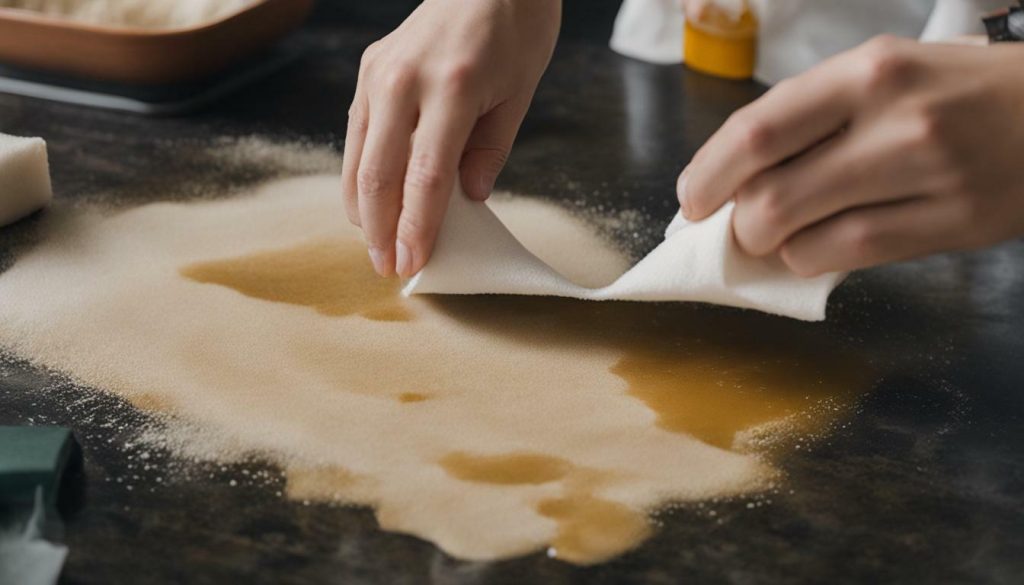
To start tackling that cat pee smell, the first step is to carefully soak up the urine using paper towel or cloth, and then cleanse the area with cold water. This will help prevent the stain and odor from setting in. It’s important to act quickly, as allowing the urine to sit for too long can make it more difficult to remove.
When cleaning with cold water, avoid using hot water or any heat sources, as heat can actually set the stain and make the urine odor more potent. Instead, opt for cold water to effectively clean the affected area.
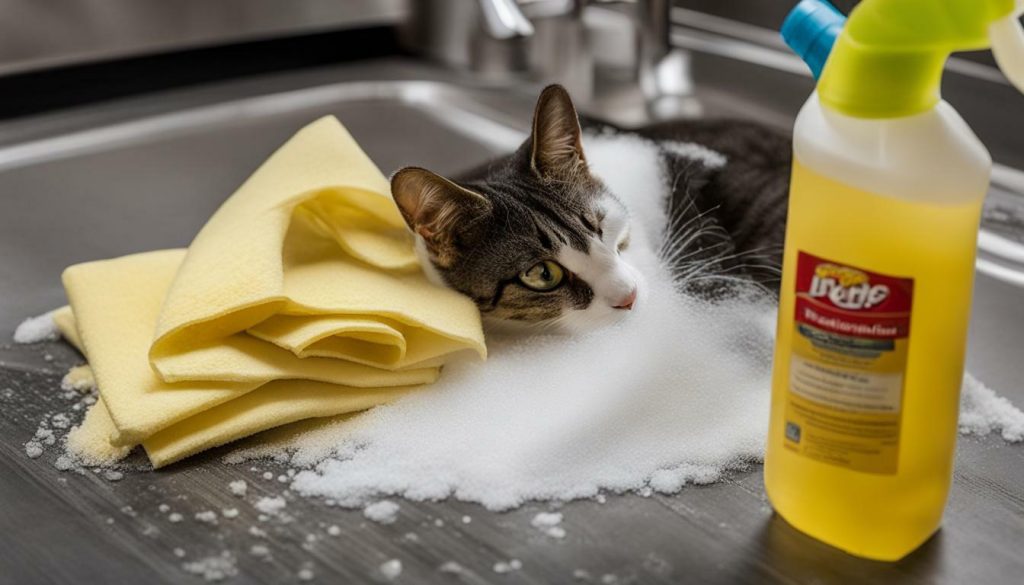
“The sooner you clean up cat urine, the better. Bacteria in the urine can decompose chemicals, creating a strong ammonia-like smell,” advises cat behavior expert, Dr. Emily Thompson. “By promptly soaking up the urine and cleaning with cold water, you can minimize the chances of lingering odors.”
By following these steps, you’re well on your way to eliminating the cat pee smell from your home. Remember to be gentle when soaking up the urine and use cold water to prevent the odor from intensifying. With patience and the right techniques, you can successfully remove cat pee odor from your property.
Avoiding Ammonia-Based Cleaners
While it may seem counterintuitive, using ammonia-based cleaners to eliminate cat pee smell can actually make the problem worse – opt for ammonia-free alternatives instead. Ammonia has a similar scent to cat urine, so using cleaners that contain ammonia can attract cats to urinate in the same spot again. To effectively eliminate the odor, it’s important to choose products that are specifically designed for removing cat urine smell.
Ammonia can also have a negative impact on cats’ health. The strong scent of ammonia can irritate their respiratory system and cause discomfort. Cats have a much more sensitive sense of smell compared to humans, so even small amounts of ammonia can be overwhelming for them.
Instead of ammonia-based cleaners, look for products that are labeled as ammonia-free. These cleaners are specifically formulated to break down the components of cat pee, eliminating the odor at its source. They are safe to use around cats and won’t attract them to the same spot. Additionally, some ammonia-free cleaners also contain enzymes that help to further neutralize the odor, providing a more effective solution.
By using ammonia-free cleaners, you can effectively eliminate cat pee smell without any negative consequences for your cat’s health or behavior.
Using Enzyme Cleaners and Solutions of Baking Soda and White Vinegar
When it comes to banishing that stubborn cat pee smell, enzyme cleaners and a combination of baking soda and white vinegar can work wonders – here’s how to use them.
Enzyme cleaners are specifically designed to break down the proteins in cat urine, eliminating the odor at its source. Start by blotting up the urine with paper towel or cloth. Then, generously apply the enzyme cleaner to the affected area, making sure to saturate it completely. Let the cleaner sit for the recommended amount of time as per the product instructions, usually around 15 to 20 minutes. This allows the enzymes to penetrate deep into the carpet fibers or other surfaces and effectively neutralize the odor. After the designated time has passed, blot up any excess moisture with clean, dry towels.
Another effective solution for neutralizing cat urine smell is a combination of baking soda and white vinegar. To use this method, first blot up the urine with paper towel or cloth. Then, mix equal parts of white vinegar and water in a spray bottle. Spray the solution onto the affected area, ensuring that it is thoroughly saturated. Next, sprinkle a generous amount of baking soda over the vinegar solution, and gently work it into the carpet or fabric using a soft brush or cloth. Allow the mixture to dry completely, and then vacuum up the remaining baking soda. The combination of baking soda and white vinegar helps to neutralize the odor and break down any remaining urine residue.
Remember, when using enzyme cleaners or the baking soda and white vinegar solution, it is important to test them on a small, inconspicuous area first to ensure that they do not cause any damage or discoloration. Additionally, always follow the product instructions and guidelines for best results.
| Tip: | Open windows or use fans to promote airflow and aid in the drying process. |
|---|---|
| Tip: | For heavily soiled areas, you may need to repeat the process multiple times or consider professional cleaning services. |
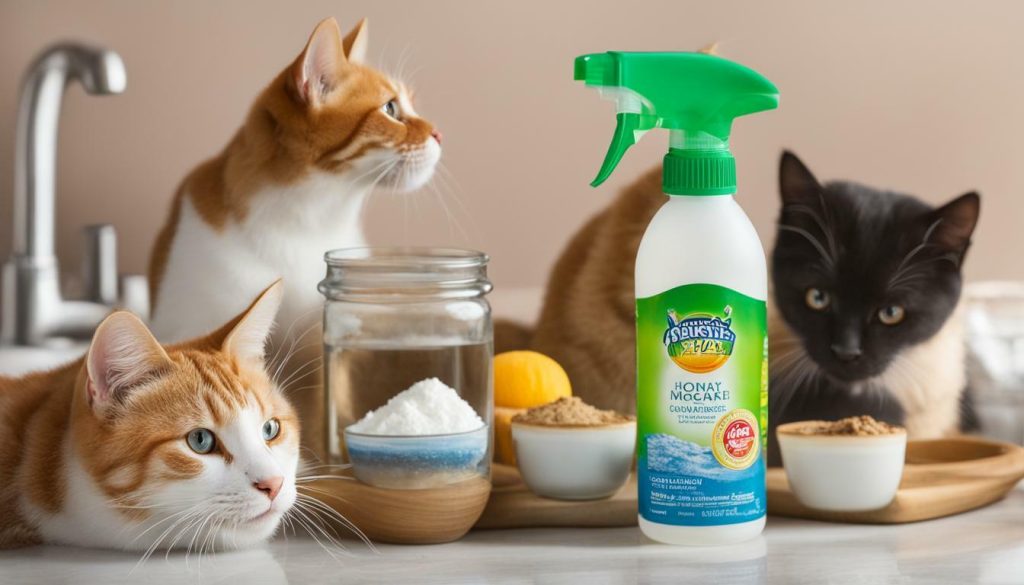
By using enzyme cleaners and a combination of baking soda and white vinegar, you can effectively neutralize the smell of cat pee and eliminate it from your home. These solutions are safe, affordable, and readily available, making them a go-to choice for many pet owners.
Addressing Underlying Issues and Preventing Future Accidents
Simply cleaning up the cat pee smell isn’t enough – it’s essential to address the root causes and take preventive measures to ensure it doesn’t happen again. Understanding why your cat is peeing in the house is crucial to resolving the problem. Medical problems, behavior issues, and lack of access to a clean litter box can all be underlying causes.
To prevent future accidents, it’s important to tackle any medical issues your cat may be experiencing. If you suspect a medical problem, consult with your veterinarian to rule out any underlying health conditions. Behavioral problems can also contribute to inappropriate urination. Cats may pee outside the litter box due to stress, anxiety, or territorial disputes with other pets. Creating a calm and enriching environment for your cat can help alleviate these issues.
Maintaining clean litter boxes is another key factor in preventing future accidents. Cats are naturally clean animals and prefer a fresh, odor-free litter box. Ensure that you have enough litter boxes for your cat and that they are cleaned regularly. A good rule of thumb is to have one litter box per cat, plus an extra one. Regularly scooping the litter and completely changing it at least once a week will help keep your cat happy and prevent them from seeking out alternative bathroom spots.
By addressing the underlying issues causing inappropriate urination and taking preventive measures, you can effectively say goodbye to the cat pee smell. Remember, a clean and stress-free environment, along with a healthy litter box routine, can go a long way in keeping your home odor-free. Be patient and persistent in finding the root of the problem, and your cat will thank you for it.

Different surfaces require different approaches when it comes to eliminating cat pee smell – here’s how you can effectively tackle it on different types of surfaces. Whether it’s hard surfaces, furniture, mattresses, or even clothes, these tips will help you say goodbye to that lingering odor.
Hard Surfaces:
For hard surfaces, start by blotting up the urine with paper towel or cloth. Then, mix a solution of dish soap and water and use it to clean the affected area. To neutralize any remaining odor, sprinkle baking soda over the spot and let it sit for a while before wiping it away.
Furniture:
If your furniture has been marked by your feline friend, create a vinegar and water solution by mixing equal parts and use it to clean the affected area. Alternatively, you can sprinkle baking soda on the spot and let it sit for a few hours before vacuuming it up. Both methods help to eliminate the smell effectively.
Mattress:
To remove cat pee smell from a mattress, you’ll need to take a multi-step approach. Start by soaking the area with vinegar and letting it sit for a while. Then, use an enzyme treatment spray specifically designed for removing pet odors. Follow the instructions on the product carefully to ensure thorough odor elimination.
Clothes:
If your clothes have been marked by cat pee, don’t panic. Soak them in a mixture of vinegar and water for about 30 minutes before washing them separately with laundry detergent that contains enzymes. The enzymes will help break down the urine and eliminate the odor.
Remember, always test any cleaning solution on a small, inconspicuous area first to ensure it doesn’t damage or discolor the surface. With these tips, you can successfully remove cat pee smell from different surfaces and restore a fresh and clean environment in your home.
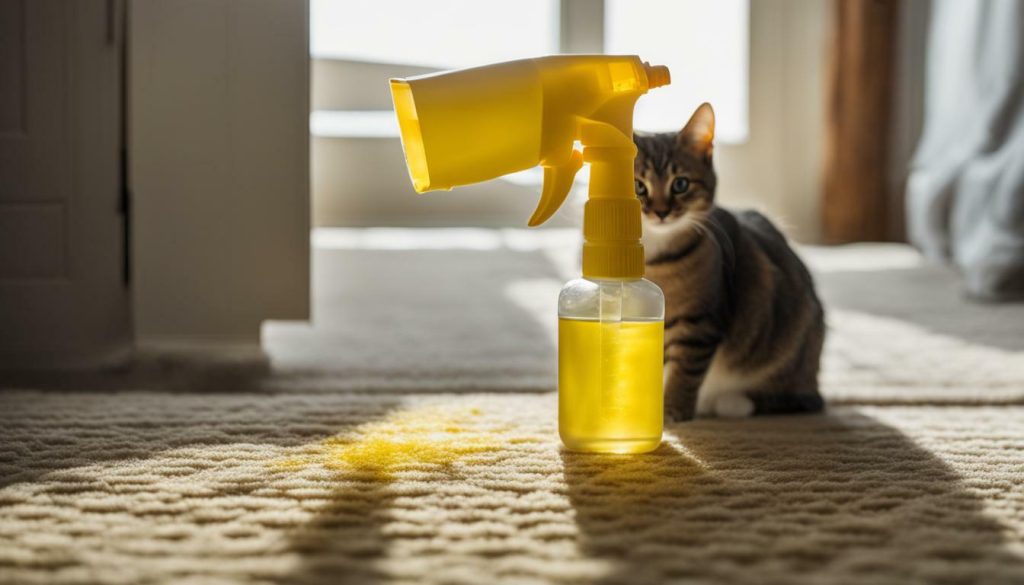
| Surface | Method |
|---|---|
| Hard Surfaces | Blot urine, clean with dish soap and water, sprinkle baking soda |
| Furniture | Clean with vinegar and water solution, or sprinkle baking soda and vacuum |
| Mattress | Soak with vinegar, use enzyme treatment spray |
| Clothes | Soak in vinegar and water, then wash with enzyme-containing detergent |
Taking Preventive Measures to Discourage Inappropriate Urination
Prevention is key when it comes to dealing with cat pee smell – let’s explore a few steps you can take to prevent your furry friend from peeing in the wrong places.
First and foremost, increasing the number of litter boxes in your home can significantly reduce the likelihood of inappropriate urination. As a general rule, you should have one litter box per cat, plus one extra. This ensures that each cat has ample access to a clean and private place to do their business. Additionally, strategically placing the litter boxes in different areas of your home can also help to prevent accidents.
Regular cleaning of the litter boxes is essential. Cats are known for their cleanliness, and if their litter box is not up to their standards, they may seek other places to relieve themselves. Scoop the litter boxes daily and replace the litter at least once a week. Cats are more likely to use a clean litter box and less likely to go elsewhere.
It’s also crucial to address any lifestyle stresses that may be affecting your cat. Cats are sensitive creatures, and changes in their environment or routine can lead to stress and anxiety, which may manifest as inappropriate urination. Make sure your cat has a peaceful and secure environment, provide them with plenty of toys and scratching posts to keep them mentally stimulated, and spend quality time with them to reinforce the bond.
| Litter Box Tips | Preventive Measures |
|---|---|
| Increase the number of litter boxes | One per cat plus one extra |
| Clean the litter boxes regularly | Scoop daily, replace litter weekly |
| Address lifestyle stresses | Provide a peaceful environment, mental stimulation, and quality time |
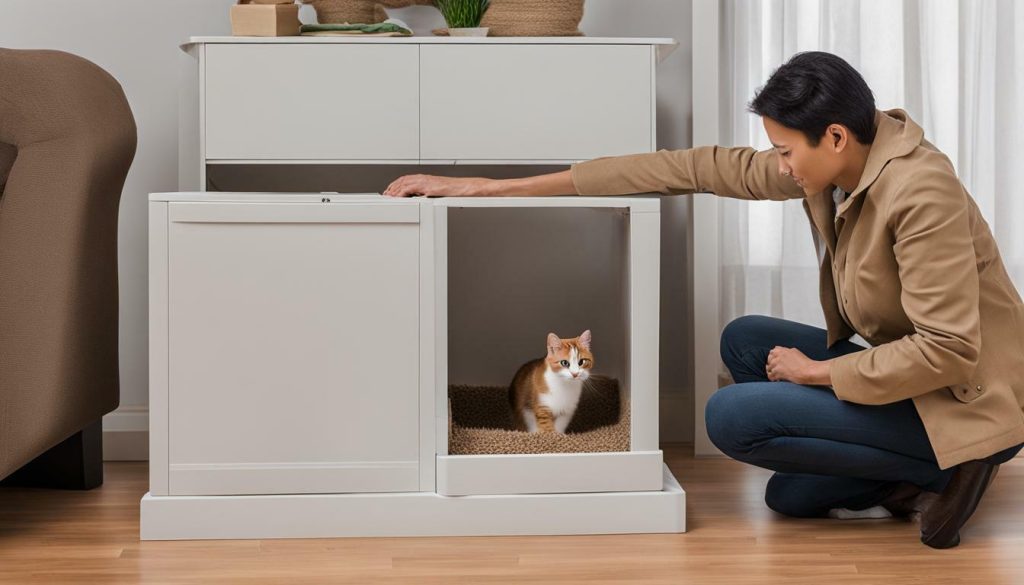
With these expert tips and methods at your disposal, you can finally bid farewell to that pesky cat pee smell and enjoy a fresh, odor-free home once again.
Understanding why your cat is peeing in the house is crucial to resolving the problem. Medical problems, behavior issues, and lack of access to a clean litter box can all be causes. By addressing these underlying issues, you can prevent future accidents and create a more conducive environment for your cat.
Timing is important when cleaning up cat pee. The sooner you clean it up, the better, as bacteria in the urine decompose chemicals that create a strong, ammonia-like smell. Soaking up the urine with paper towel or cloth and cleaning the area with cold water can help minimize the lingering odor.
Avoiding ammonia-based cleaners is essential, as they can attract cats to urinate in the same spot. Instead, opt for ammonia-free cleaners that are safer for both you and your cat. Enzyme cleaners and solutions of baking soda and white vinegar are particularly effective at neutralizing the smell of cat pee and can be applied to different surfaces.
Remember to address the specific needs of different surfaces when removing cat pee smell. From hard surfaces to furniture, mattresses, and clothes, there are specific steps you can take to eliminate the odor. By following the appropriate cleaning techniques and using the right products, you can say goodbye to that lingering cat urine odor.
Finally, taking preventive measures is key to discouraging cats from peeing on household objects. This includes increasing the number of litter boxes, maintaining their cleanliness, and addressing any lifestyle stresses your cat may be experiencing. By creating a comfortable and stress-free environment, you can help prevent inappropriate urination and maintain a fresh-smelling home.
FAQ
Why is my cat peeing in the house?
Cats may pee in the house due to medical problems, behavior issues, or lack of access to a clean litter box.
Why is it important to clean up cat pee as soon as possible?
Bacteria in the urine decompose chemicals that create a strong, ammonia-like smell, so cleaning it up promptly helps prevent the odor from becoming worse.
What should I use to clean up cat pee?
Start by soaking up the urine with paper towel or cloth. Then, use cold water to clean the area, as heat can make the stain and odor more difficult to remove.
Can I use ammonia-based cleaners to remove cat pee smell?
It’s best to avoid ammonia-based cleaners, as they can encourage cats to urinate in the same spot. Choose ammonia-free cleaners instead.
What are effective solutions for neutralizing cat pee smell?
Enzyme cleaners and solutions of baking soda and white vinegar are effective at neutralizing the smell of cat pee. Apply the solution to the affected area and let it sit before blotting and rinsing.
How can I prevent future accidents?
Addressing the underlying issues causing inappropriate urination, such as medical problems or behavioral issues, is important to prevent future accidents. Additionally, increasing the number of litter boxes, cleaning them more frequently, and addressing any lifestyle stresses on the cat can help.
How do I remove cat pee smell from hard surfaces?
Blot up the urine, clean with a solution of dish soap and water, and sprinkle baking soda to neutralize any remaining odor.
How do I remove cat pee smell from furniture?
Use a vinegar and water solution to clean the affected area, or sprinkle baking soda and vacuum it up after it sits for a while.
How do I remove cat pee smell from a mattress?
Soak the area with vinegar and let it sit before using an enzyme treatment spray.
How do I remove cat pee smell from clothes?
Soak them in a vinegar and water solution or wash them separately with a laundry detergent containing enzymes.
How can I discourage cats from peeing on household objects?
Take preventive measures such as increasing the number of litter boxes, cleaning them more frequently, and addressing any lifestyle stresses on the cat.





